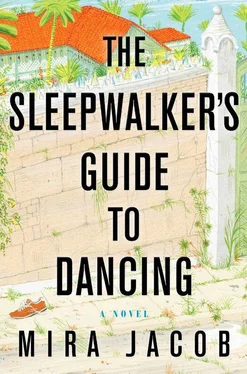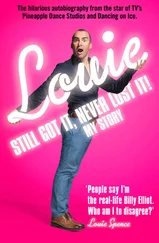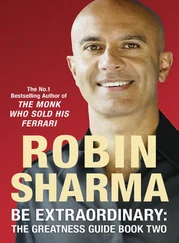“He’s wearing a uniform.”
“He’s wearing feathers,” Amina said.
“What?”
The Crystal Blue was slipping through the water at a steady pace, gliding closer to the bridge and the man, and now Amina could see him clearly through her viewfinder, his headdress shivering in the breeze.
“Hey, did they arrange for a bungee jumper?” Orange Shorts called out, pointing at the bridge. Heads turned up. The words buzzed over the lips of the crowd.
“Bungee jumper!” Someone yelled. A whoop went up from the boat.
This seemed to startle the man in the headdress, and he wobbled on the bridge uncertainly, eliciting a collective gasp. Amina moved to the edge of the prow, steadying herself against the railing.
The high wail of sirens seeped toward them, growing louder. Police cars were coming down Aurora in a steady line, and an ambulance followed, lights flashing. The whole boat seemed to swell with recognition: Look! Police! It’s a jumper! People were pressing in on her sides now, and Amina nudged them away, ignoring a disgruntled huff in her ear. She pulled her lens wide to get a better read on the cars, and this is what she was doing when Bobby McCloud decided to take a step forward. Not that she knew his name, or anything else about him at the time — all of those details would come later, as she scoured every last article she could find.
For weeks, months, she would wonder what made her ratchet up the aperture so suddenly, what guided her finger to the shutter release so that when Bobby McCloud flew past her lens, she would capture him. And yet she had done it. She’d gotten the impossible shot. In the photograph that appeared next to the article, her first ever and only to run on a front page, Bobby McCloud would appear forever suspended between the arching underside of the Aurora Bridge and the flat screen of the water, his headdress folding against the air like wings in prayer, his arms flung wide.
“Spectacular,” the photo editor had said before rushing the picture to print.
He had pulled a few other pictures from her roll (“Where are the afters?” he had asked, looking fleetingly disappointed when she shook her head) and now turned his attention to the televisions in the far corner of the room. All three local stations were covering the story in as much depth as the few hours allowed, taking statements from eyewitnesses and panning again and again to the railing on the bridge.
Amina watched, wishing she felt sick, or distraught, or anything other than coolly relieved. Even the Microsoft crowd had the decency to be rattled — telling and retelling the last twenty minutes of the ride in shaky voices, as if there were some clue between seeing the man and watching him fall that would reverse the motion. One woman just bawled and bawled until two female colleagues hoisted her to the lower-deck bathroom.
Amina left the office, driving immediately to Linda’s Tavern. Forty minutes later, snug in the peaty blur of three beers, she ordered a fourth. When the door opened to reveal a young man wearing a jacket that looked like the one Akhil died in, her hands began to shake.
It was the money that killed him. That’s what the papers said, first the P-I and The Seattle Times , then the San Francisco Chronicle, The Washington Post , and The New York Times as the story went national. The $162 million settlement for the Puyallup Tribe of Tacoma Indians — the second-largest in history between the Native Americans and the U.S. government — had come for Bobby McCloud like it had for his brother, his cousin, and his uncle before that.
In the library, hunched over the microfiche reader in a sour-smelling sweatshirt, Amina followed the previous years’ news. The tribe’s decision to give up their claim to the land along the Tacoma basin had been contentious from the start. The land—18,000 acres that were allotted to them in the Treaty of Medicine Creek in 1854 and then slowly poached in a series of “negotiations” that left them on about 33 acres by 1934—was their birthright. Taking money for it was a direct refutation of that right, and of everything their ancestors had stood for. It would only bring harm, even if it did give every member of the tribe twenty thousand dollars right away.
Blood money , Amina heard Akhil saying so clearly that for a minute it seemed the past nine years had not actually occurred. She looked up from the hum of the microfiche, but the only other person in that dank corner of the library was an old man who looked half-asleep. She read on.
Opinions on taking the settlement varied widely within the tribe, as did the imagined uses of the twenty thousand dollars. People said they’d get food, winter clothes, but some expressed misgivings.
“I’m just trying to make sure I don’t blow it,” Raydene Feaks, a thirty-four-year-old recovering crack addict at the tribal treatment center, said (PUYALLUP TRIBE PREPARES FOR WINDFALL, Seattle Post-Intelligencer , February 23, 1990).
“The twenty thousand is not the point,” Bobby McCloud maintained. “The one hundred thirty-eight million in social programs, and business start-up money, and land — that’s going to be the end to our poverty.”
Bobby McCloud did not drink. He did not smoke, and he did not allow smoking in his office at the Tribal Center, where pictures of him with Jesse Jackson and Bill Clinton hung on the walls, along with his diploma from the University of Washington. At age thirty-six, Bobby McCloud was one of the very few in the tribe who had managed to dodge every statistic coming at him, from the eight-thousand-dollar median income to the ninth-grade level of education to the 50 percent chance of becoming dependent on alcohol or drugs by the time he was sixteen.
“Everyone is saying our birthright is the land. Our birthright is to live! It’s to succeed, and grow, and watch our children grow,” Bobby McCloud said.
A-fucking-men, Red Man .
She must have PTSD. Or maybe it was just run-of-the-mill drunkenness. Or simply the obvious reaction to stumbling into the exact kind of story that would have infuriated her brother. The second time Amina heard Akhil, she was in bed, photocopies of Bobby McCloud articles scattered in piles around her. She blinked down the dark hallway that cut through the center of her railroad apartment. It was empty. She got up and shut the bedroom door.
When the phone rang, jolting her out of a midafternoon nap, Amina knocked over the glass of water on her bedside table. “Shit.”
“They are calling because you own the rights,” Dimple said. “You’ve got to do something.”
The water spilled over the edge and began pattering down on the last shirt she’d worn outside of the house three days earlier. Amina added a few stray socks to the pile to soak it up. A mostly full bottle of whiskey stood sentry on the nightstand, watching.
“Amina, are you listening to me?”
“Yeah.”
It had been a mistake to tell Dimple about the calls. Of course she was going to want to “take advantage” of the offers coming in from agencies wanting the picture. Of course she would see this as an opportunity for them to “cut their teeth” (an expression that always brought the image of a horse bit into Amina’s mind) in the world of agencies.
“We’ve got an open window now,” Dimple was saying. “Right now. Not forever and maybe not even tomorrow. All we need to do is make some calls. I guess I just really don’t understand what the fucking problem is here.”
Stop the presses. Dimple doesn’t understand something .
“Shut up,” Amina said.
“What?”
Amina pressed her eyelids until circles popped in their meaty darkness. “I just … I think the P-I might own the rights.”
Читать дальше












